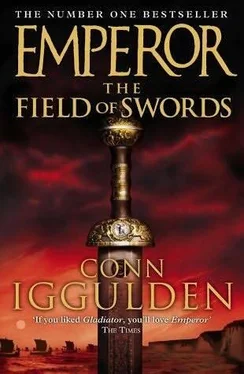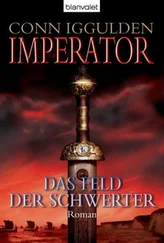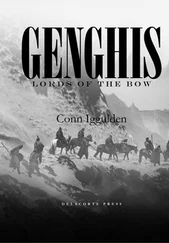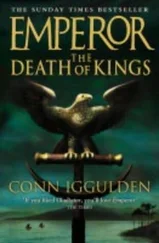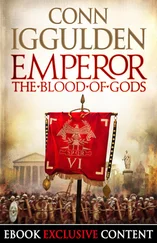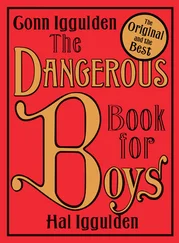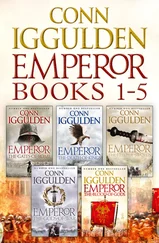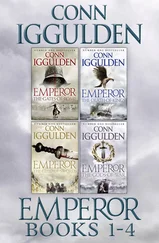Alexandria had excelled herself with the high sheen of the metal they wore. Julius was sure the quality of the finalists was in part due to the promise that they would be allowed to keep the armor after the bouts were over. In sheer weight, each set would buy a man a small farm if he sold it, and with the fame of the contest spread far, they could bring more than that. Julius tried not to think how much they had cost him.
The whole of Rome had talked about his generosity, and they did look fine in the sun.
A few of the fighters showed bruises from the early rounds. It had been a civilized few days, with only four men dead and those from accidental strikes in the heat of a contest. First blood ended each bout, with no other limit except exhaustion. The longest before the finals had lasted the best part of an hour, and both men had barely been able to stand when it was settled with a clumsy cut across the back of a leg. The crowd had cheered the loser as loudly as the man who went on to the finals.
The first rounds had been a riot of skill and strength, with more than a hundred pairs on the sand at the same time. In its way, seeing so many swords flashing was as exciting as the individual bouts of the last thirty-two, though the true connoisseurs preferred the single contests, where they could concentrate on styles and skill.
The range was staggering and Julius had made notes on a number of men to recruit for the new legion at the barracks. Already he had bought the services of three good swordsmen. Of necessity, he had been forced to hire those who fought in the Roman style, but it pained him to overlook some of the others. The call for fighters had spread much farther than his messengers, and there were men there from all over Roman lands and even farther. Africans mixed with men the color of mahogany from India and Egypt. One man, Sung, had the slanted eyes of races so far to the east they were almost mythical. Julius had been forced to assign guards to stop the crowds trying to touch him in the streets. The gods alone knew what he was doing so far from his home, but the long sword Sung carried was wielded with a skill that had brought him into the last rounds with the shortest bouts of all the men there. Julius watched him as he saluted the consuls with the others, and determined to make the man an offer if he reached the Eights, Roman style or not.
At this late stage, the names of the men on the sand were announced to the crowd, each stepping forward to be cheered by the people of Rome. Brutus and Octavian stood together with Domitius, their armor glowing in the sun. Julius smiled at the pleasure he saw in their expressions. No matter who won the victor’s sword, they would never forget the experience.
The three Romans raised their blades to the crowd and then to the consuls. The crowd roared, a wall of sound that was astonishing, almost painful. The day had begun. The announcer stepped up to the brass tubes that magnified his voice and bellowed the names of the first bout.
Domitius was to face a northerner who had traveled home with his legion commander’s permission to attend the tournament. He was a big man with powerful forearms and a narrow, supple waist. As the others left the sand, he eyed Domitius warily, watching as Domitius began his stretching exercises. Even from a distance, Julius could see no sign of tension on Domitius’s face. He felt his heart beat faster with growing excitement, and the others in the box sensed it too. Pompey stood and clapped a hand on his shoulder.
“Should I bet on your man, Julius? Will he make the Sixteens?”
Julius turned and saw the glint in the consul’s eyes. A line of shining perspiration had appeared on Pompey’s forehead, and his eyes were bright with anticipation. Julius nodded.
“Domitius is the second-best swordsman I have ever seen. Summon the betting slaves and we will throw a fortune on him,” he said. They grinned like boys together and it was difficult to remember this man was not a friend.
The slave came in at their call, ready for them. Pompey raised his eyes in exasperation as Crassus counted out three silver coins to hand to the boy.
“Just once, Crassus. Just once, I would like to see you bet enough for it to hurt you. There is no joy in small coins. It must sting a little.”
Crassus frowned, glancing at Julius. A dark flush spread into his cheeks as he put his coins away.
“Very well. Boy, give me your betting slate.”
The slave produced a wooden square covered in a thin skin of wax, and Crassus pressed his ring into it, writing his name and figures without showing them to the others. As he passed it back, Pompey reached out and twitched it away, whistling softly to himself. The slave waited patiently.
“A fortune indeed, Crassus. You amaze me. One gold piece is more than I have ever seen you bet on anything.”
Crassus snorted and looked away at the two fighters, watching them walk to their positions and wait for the horn to be blown.
“I’ll put a hundred on your man, Julius. Will you match me?” Pompey asked.
“A thousand for me. I know my man,” Julius replied.
Pompey’s face hardened at the challenge. “Then I shall match you, Julius.”
The two men wrote the sums and their names on the wax square.
Renius cleared his throat. “Five gold on Domitius for me,” he said gruffly.
Of all of them, he was the only one to actually produce the coins, holding them out stiffly until the slave took them from his hands. The old gladiator watched until the gleam disappeared into a cloth bag, then sat back, sweating. Suetonius had been about to hand over his own bet, but returned to his father for funds after seeing that. Ten gold pieces were produced from them and the slate was passed around one more time, with even Bibilus risking a few silvers from his purse.
The slave scurried back to his master and Julius stood to signal the cornicens. The crowd became quiet as they saw him stand, and he wondered how many of them would remember his name at the elections. He savored the stillness for an instant, then brought his hand chopping down. The sharp wail of the horns rang out over the sand.
Domitius had watched as many of the early bouts as he could when he was not fighting himself. He had made notes on those he thought would win through to the later rounds, and of the last thirty-two only half of them were truly dangerous. The northerner he faced was skilled enough to have reached this stage, but he panicked when he was crowded and Domitius intended to crowd him from the very first moment.
He felt the man’s eyes on him as Domitius stretched his back and legs, and kept his face as peaceful and unhurried as he possibly could. He had fought in enough tournaments to know that many bouts were won not with the sword but in the moments before it. His old trainer had had a habit of sitting with his legs split and flat on the ground in utter stillness before his opponents. While they lunged and jumped to loosen their muscles, that man had been like a rock and nothing unnerved them as much as that. When finally he had risen like smoke to face them, the battle was already half won. Domitius had understood the lesson and he allowed none of his tiredness to show in his movements. In truth, his right knee felt stiff and painful where it had been jolted in an earlier bout, but he did not wince, moving slowly and fluidly through his exercises, mesmerizing in their smoothness. He felt a great calm descend on him and offered up a silent prayer for his old teacher.
Holding his sword low and away from his body, Domitius came to his mark and stood motionless. His opponent rolled his shoulders in a nervous action, flicking his head from side to side. When their eyes met, the northerner glared at him, unwilling to be the first to look away. Domitius stood like a statue, the sharply defined muscles of his shoulders shining with sweat. The silver armor protected the chests of the fighters, but Domitius could shave a lock of hair from a man running past him and he felt strong.
Читать дальше
Конец ознакомительного отрывка
Купить книгу
